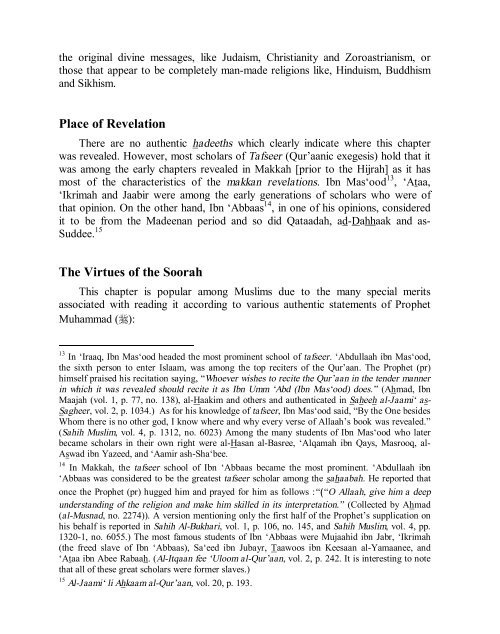You also want an ePaper? Increase the reach of your titles
YUMPU automatically turns print PDFs into web optimized ePapers that Google loves.
the original divine messages, like Judaism, Christianity and Zoroastrianism, or<br />
those that appear to be completely man-made religions like, Hinduism, Buddhism<br />
and Sikhism.<br />
Place of Revelation<br />
There are no authentic hadeeths which clearly indicate where this chapter<br />
was revealed. However, most scholars of <strong>Tafseer</strong> (Qur’aanic exegesis) hold that it<br />
was among the early chapters revealed in Makkah [prior to the Hijrah] as it has<br />
most of the characteristics of the makkan revelations. Ibn Mas‘ood 13 , ‘Ataa,<br />
‘Ikrimah and Jaabir were among the early generations of scholars who were of<br />
that opinion. On the other hand, Ibn ‘Abbaas 14 , in one of his opinions, considered<br />
it to be from the Madeenan period and so did Qataadah, ad-Dahhaak and as-<br />
Suddee. 15<br />
The Virtues of the Soorah<br />
This chapter is popular among Muslims due to the many special merits<br />
associated with reading it according to various authentic statements of Prophet<br />
Muhammad (r):<br />
13 In ‘Iraaq, Ibn Mas‘ood headed the most prominent school of tafseer. ‘Abdullaah ibn Mas‘ood,<br />
the sixth person to enter Islaam, was among the top reciters of the Qur’aan. The Prophet (pr)<br />
himself praised his recitation saying, “Whoever wishes to recite the Qur’aan in the tender manner<br />
in which it was revealed should recite it as Ibn Umm ‘Abd (Ibn Mas‘ood) does.” (Ahmad, Ibn<br />
Maajah (vol. 1, p. 77, no. 138), al-Haakim and others and authenticated in Saheeh al-Jaami‘ as-<br />
Sagheer, vol. 2, p. 1034.) As for his knowledge of tafseer, Ibn Mas‘ood said, “By the One besides<br />
Whom there is no other god, I know where and why every verse of Allaah’s book was revealed.”<br />
(Sahih Muslim, vol. 4, p. 1312, no. 6023) Among the many students of Ibn Mas‘ood who later<br />
became scholars in their own right were al-Hasan al-Basree, ‘Alqamah ibn Qays, Masrooq, al-<br />
Aswad ibn Yazeed, and ‘Aamir ash-Sha‘bee.<br />
14 In Makkah, the tafseer school of Ibn ‘Abbaas became the most prominent. ‘Abdullaah ibn<br />
‘Abbaas was considered to be the greatest tafseer scholar among the sahaabah. He reported that<br />
once the Prophet (pr) hugged him and prayed for him as follows :“(“O Allaah, give him a deep<br />
understanding of the religion and make him skilled in its interpretation.” (Collected <strong>by</strong> Ahmad<br />
(al-Musnad, no. 2274)). A version mentioning only the first half of the Prophet’s supplication on<br />
his behalf is reported in Sahih Al-Bukhari, vol. 1, p. 106, no. 145, and Sahih Muslim, vol. 4, pp.<br />
1320-1, no. 6055.) The most famous students of Ibn ‘Abbaas were Mujaahid ibn Jabr, ‘Ikrimah<br />
(the freed slave of Ibn ‘Abbaas), Sa‘eed ibn Jubayr, Taawoos ibn Keesaan al-Yamaanee, and<br />
‘Ataa ibn Abee Rabaah. (Al-Itqaan fee ‘Uloom al-Qur’aan, vol. 2, p. 242. It is interesting to note<br />
that all of these great scholars were former slaves.)<br />
15 Al-Jaami‘ li Ahkaam al-Qur’aan, vol. 20, p. 193.














